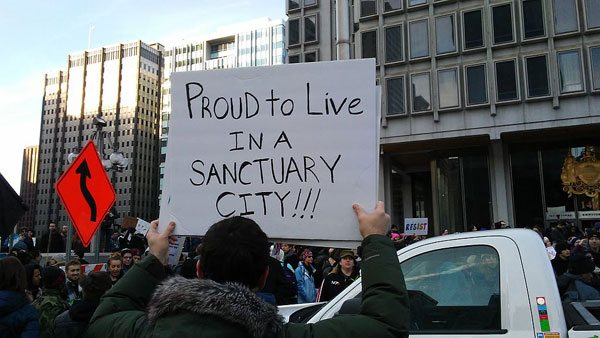
August 31, 2017; Al Jazeera, Dallas Morning News, and Washington Post
The importance and impact of the federal judiciary was felt (again) on August 30th when federal U.S. District Judge Orlando Garcia in San Antonio issued a 94-page ruling that blocked the implementation of Texas Senate Bill 4 (SB4).
The ruling stopped what was widely viewed as the toughest immigration measure in the nation since Arizona passed what critics called a “Show Me Your Papers” law in 2010, which was later partially struck down by the U.S. Supreme Court. SB4 would have gone into effect on September 1st and would have essentially banned sanctuary cities in Texas, fining them and officials who did not cooperate with federal immigration authorities.
The law would fine local officials who refused to assist federal agencies in working to deport illegal immigrants up to $25,500 a day. Elected and appointed officials could lose their jobs, and police and sheriffs could go to jail for up to a year on misdemeanor charges.
The small border city of El Cenizo sued to stop the law and was soon joined by Houston, San Antonio, Dallas, Austin, and other cities. The fear was that the law could lead to racial profiling, make immigrants afraid to report crime, and ignite a backlash of boycotts and similar measures that could devastate the state economically.
This is not the first time that state laws have clashed with local cities, communities, and law enforcement around immigration issues and cooperation with federal authorities. As reported in NPQ, the track record for such laws withstanding scrutiny in the federal courts is not good, especially on issues of immigration. In Texas, and elsewhere, the support of the Trump administration and the Department of Justice for these laws has not tipped the balance in these rulings in favor of the state.
Sign up for our free newsletters
Subscribe to NPQ's newsletters to have our top stories delivered directly to your inbox.
By signing up, you agree to our privacy policy and terms of use, and to receive messages from NPQ and our partners.
In his ruling on SB4, Judge Garcia found most but not all of the law to be unconstitutional. Texas law, he wrote, was preempted by existing federal statute and was therefore unconstitutional. He also noted there was “overwhelming evidence by local officials, including local law enforcement, that SB4 will erode public trust and make many communities and neighborhoods less safe” while adding that “localities will suffer adverse economic consequences which, in turn, will harm the state of Texas.”
This was the position taken by local Texas local officials and law enforcement, who felt the law would make their work more difficult. Disputed by most Texas Republican lawmakers, Governor Greg Abbott, and Texas Attorney General Ken Paxton, the ruling was appealed by the attorney general one day after it was issued. Governor Abbott issued a written statement that targeted Travis County, where Austin is the largest city: “Today’s decision makes Texas’s communities less safe,” Abbott said. “Because of this ruling, gang members and dangerous criminals, like those who have been released by the Travis County Sheriff, will be set free to prey upon our communities.”
It should be noted that Judge Garcia’s order did not block SB4 in its entirety. He allowed the portion of the law that allows police officers to ask people’s immigration status during any legal detentions, but limited what could be done once it was learned that a person was undocumented. This aligns with the portions of the Arizona’s 2010 law that were upheld by the U.S. Supreme Court and allows police to check the immigration status of people they stop during the normal course of their duties.
This ruling in the federal court was welcomed by Texas Democrats, who fought for it in the legislature, and for those who work on immigrant and refugee rights. “The Court was right to strike down the guts of a law that is not only patently unconstitutional but bad policy as well,” said Lee Gelernt, an ACLU lawyer who argued against the case in court on behalf of several Texas cities and towns. “Hopefully, other states will now not follow Texas’s lead.”
Legislative action around SB4 follows a court ruling against the Trump administration’s executive order issued in January 2017 that threatened to withhold federal funds from sanctuary cities. That order was also halted by a federal judge, who indicated it was overly broad. The administration has since pursued ways to move funding away from cities and towns that refuse to help enforce immigration law. Further lawsuits around these federal actions are now moving forward.
As these lawsuits wend their way through the federal court system, the importance of these courts and their judges, who hold lifetime appointments (voted on by the U.S. Senate), has become a critical issue. While it is possible that this appeal might get to the Supreme Court, it is just as likely that it could be turned down (and the lower court ruling would stand as law) or be sent back to the federal courts for further consideration. “Shopping” for a court with sympathetic judges is not unheard of in such cases. For the moment, this ruling will be seen as a victory for immigrants and immigrant rights. Whether this is temporary or not, only time and federal judges will tell.—Carole Levine











